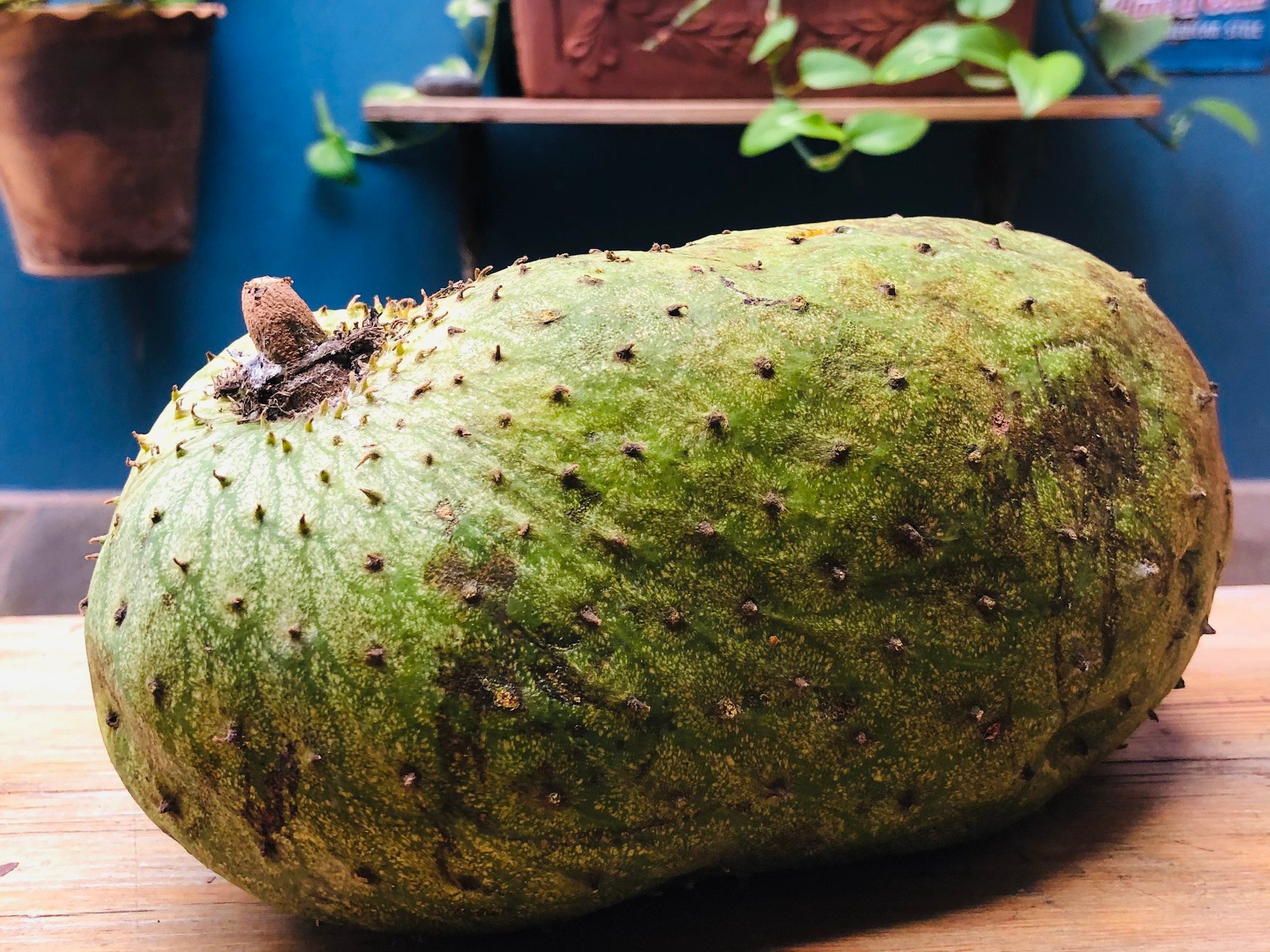
Exotic, colorful, bright and healthy, the tropical fruit that has arrived in Europe in recent years is expanding the range of fresh foods available to complement your healthy and balanced diet. Papaya, guava, chirimoya, pitahaya, and passion fruit are just a few of the new items for your table. Rich in vitamins, minerals and proteins, guanábana is one of the latest additions to the list, and its delicious flavor is complemented by cancer-fighting properties that make it even more attractive. Today, learn more about this fruit of Latin American origin that you can order from local farm La Calabacera and have delivered to your home or accommodation at Abama Resort Tenerife.
Before describing the nutritional qualities of guanábana, we have to spend a moment noting its unique form. Oval with dark green skin covered with soft spikes, the Annona muricata can measure up to 20 cm long by 25 cm wide and its weight can reach 25 kg. Despite its forbidding appearance, the rind is thin and the pulp quite creamy, so we recommend handling it with delicacy to avoid bruises and scratches. Fleshy and juicy, when ripe it is very easy to peel and eat.
How to prepare guanábana
Slightly sweet and with a touch of acidity, once opened, guanábana has a shelf life of about six days, so pulp that is not used immediately can go into the freezer for later consumption.
Guanábana is mostly enjoyed in smoothies and desserts. The blender is essential if you want to make a simple mixture of pulp with water and sugar, or you can substitute milk for the water. If you prefer a complete smoothie, guanábana combines very well with other fruit like papaya, pear, or orange. As a dessert, there are a great number of ways to prepare it, but taking advantage of the creamy texture of guanabana will yield wonderful results in custards, mousses, sorbets and jellies.
In some countries, the leaves of the tree are highly valued for the preparation of hot teas that have a relaxing effect.
A true superfruit
What could be easier than consuming your natural therapies? Recognized for its hypoglycemic properties, this tropical fruit is highly recommended for diabetic patients because it prevents glucose levels from rising suddenly. Its high content of Vitamin C makes it a powerful antioxidant, which strengthens the immune system and slows signs of aging. In addition, guanábana is a great source of fiber and has a diuretic effect that helps regulate blood pressure, especially in people who suffer from hypertension. With anti-inflammatory properties that reduce swelling and relieve pain, it is also useful in cases of gastritis. It also has good quantities of the minerals calcium, phosphorus and iron, which help maintain a balanced system and are especially important in resisting anemia and osteoporosis.
Last but not least, the fruit has significant protein content, important especially for athletes and people who engage in intense muscular activity, because it helps to replenish muscle fibers after physical effort.
Anticancer properties
There is a lot of buzz about the anticancer properties of guanábana but there are still not enough scientific studies to say anything definitive. What has been demonstrated is that it is rich in acetogenins, a metabolic complex with a cytotoxic effect. That is, the ability to cause tumor cell death via different mechanisms. This ability to directly affect cancer cells has given Annona muricata a privileged place among natural ingredients that could contribute to cancer treatments. However, studies are not conclusive and the relationship between the way the fruit is grown, the concentration of its bioactive compounds and its specific effect on certain types of cancer has not been clearly established. What has been observed in several studies is that its long-term consumption can generate a preventive effect.
Guanábana contraindications
Although it is possible to speak of guanábana among the medicinal plants, it shouldn’t be considered a miracle food. Its consumption is not recommended in people with hypotension because one of its properties is to help lower blood pressure. In pregnant women, frequent consumption or drinking tea prepared with its leaves is discouraged due to the risk of eclampsia, and the seeds should not be ingested because they are toxic. It is important to note also that the tea is also not recommended for young children. And finally, the fruit’s acidity can be unpleasant those who have mouth wounds or throat problems.
Guanábana is undoubtedly a most versatile and nutritious tropical fruit from Latin America and it is a rare privilege to have it available so close by, thanks to the wonderful and varied produce offered by La Finca La Calabacera. Take a trip to the farm to see the grounds, and get the added bonus of more information about how to include this fruit and others in your diet as part of your healthy habits for wellness.







